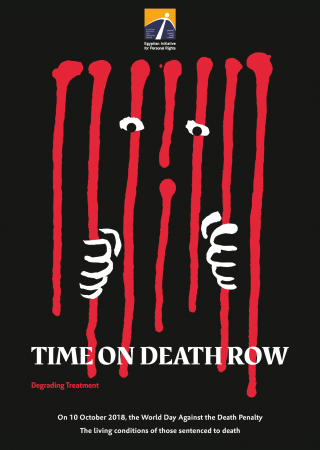April 2018 ended as one of the worst months for the issuance of death sentences. Most of these were issued in ordinary criminal cases, not political, and in one case, 45 defendants were sentenced to death, leading observers to wonder if criminal judges in Egypt have any sentencing tools at their disposal but the death penalty.
Tags: Against the Death Penalty
Death row refers to the prison area where inmates sentenced to death are detained. Prisoners are considered to be on death row from the moment they have been sentenced to death for a capital crime in the first instance, until their execution, commutation or release if they have been acquitted, including during the appeal period.
The EIPR urges the president to use the authority imparted to him by the law to substitute the death sentence with a less severe punishment until the petition to reopen the case is considered. The president has previously commuted a death sentence against Mohammed Hussein on 22 January 2017.
The Egyptian Initiative for Personal Rights criticized the parliament for approving a government-submitted bill by a two-thirds majority vote in its general session on Tuesday, March 6. The bill amends provisions of the Penal Code (Law 58/1937) to stiffen penalties on persons convicted of the possession, importation, or manufacture of explosives. According to media sources, the bill introduces the death penalty for one of the crimes set forth.
The report is divided into two chapters: the first includes factual information on some cases in which death sentences were handed out and upheld during 2017; the second identifies patterns of human rights violations which some of the defendants sentenced to the death in praesentia faced in the course of trial proceedings.
The undersigned rights groups condemn the execution of three defendants, before yesterday, in case no. 93/2011/Ismailiya plenary military felonies, following a trial before a military court that did not meet fair trial standards. With this, 22 civilians have now been put to death following military trials in just three weeks, a toll unprecedented in Egypt’s modern history.
At least 19 civilians were executed within the span of a week, pursuant to sentences given by military courts that do not meet the minimum requirements for fair trials; an increasing number of militant attacks on civilians and military personnel were also recorded during this time.
The undersigned groups condemn the execution, today, of 15 people sentenced to death in case no. 411/2013/Ismailiya plenary felonies, known as the “Officer Tracking Cell” case. This is the latest in a series of death sentences handed down without regard for basic guarantees for a fair trial.
The Egyptian Initiative for Personal Rights (EIPR) condemns the ruling by the Military Court of Alexandria on Sunday, in case No. 108/ Felonies, known as the “Planting of Explosive Devices" case. The court sentenced 14 defendants to death, 24 to life imprisonment, 15 to 15 years' imprisonment, and acquitted two defendants. EIPR also condemns the assault on the families of the accused after the verdict was issued.
The undersigned organizations reiterate that the continued issuance of death sentences does not guarantee that justice is served.The organizations call for a retrial of the defendants in this case in a process that respects fair trial standards. They also express their concern over the possibility of issuing additional death sentences this month, as verdicts are expected this month in at least five cases in which the defendants’ case files have already been referred to the Grand Mufti; at least two of these cases are before military courts.




